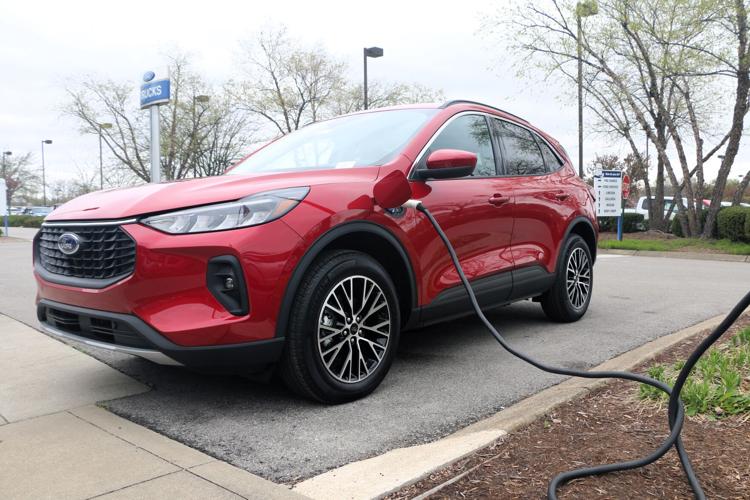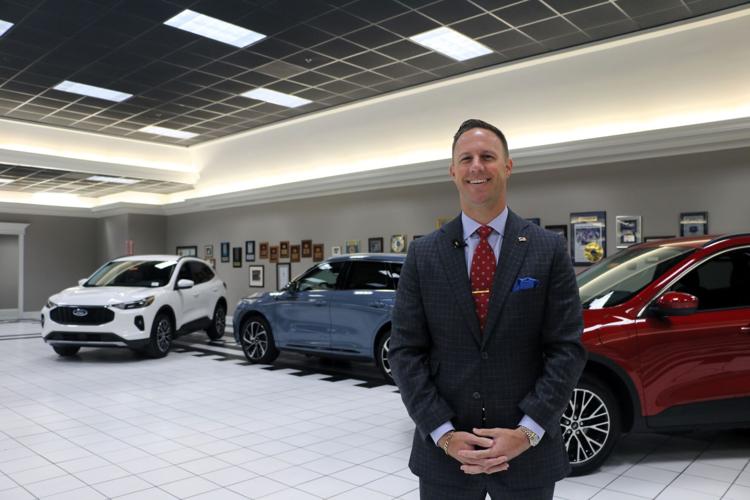LOUISVILLE, Ky. (WDRB) -- Ford Motor Co. plans to offer gas-electric hybrid versions of all its vehicles by 2030, the company said Thursday, as it continues to dial back the timing of some fully electric models.
The vehicle that best exemplifies the range of powertrains the company hopes to offer is the Louisville-made Escape SUV, which is enjoying a sharp rebound in sales this year after several years of decline.
The Escape and its upscale cousin the Lincoln Corsair are the only models Ford currently offers as plug-in hybrids — sporting a small battery that allows the car to travel on electricity alone for up to 37 miles.
Plug-in hybrids are not new. Ford used to offer them a decade ago with the Fusion and C-Max, small cars the automaker would later jettison to focus on large and profitable gas trucks.
But with so much media attention on the rise of electric vehicles in recent years, customers are more curious about alternatives to conventional gasoline cars, said Shane Collins, general manager of Collins Auto, which includes Bill Collins Ford on Bardstown Road in Louisville.
"With all the EV talk, it’s got people thinking in a lot of different directions. The hybrid Escape is not new to Ford Motor Co., but it’s kind of making a revival," Collins said.
With a refreshed design, the Escape’s sales soared 73% in the first three months of 2024, to 36,595, compared to the same period a year earlier.
Louisville Assembly Plant, which employs about 3,200 hourly autoworkers, more than tripled its Escape output during the same three-month period.
The hybrid Escape is "super popular," Ford CEO Jim Farley said at an investor conference on Feb. 15.
Still, it’s difficult to say how much of the Escape’s "revival" is due to the hybrid and plug-in hybrid versions. Ford does not publish results by powertrain for the Escape and declined to provide that information.
Ford’s overall hybrid sales rose 42% in the first quarter from a year ago, Ford said Wednesday. But the automaker’s figures show EVs and hybrids were only 11.5% of U.S. sales. Toyota, which offers nearly all its cars in hybrid form, saw nearly 37% of its sales represented by hybrids or EVs.
Besides the Escape, Ford offers only a handful of its vehicles in hybrid form — most notably, the Maverick and F-150 pickups.
"I do expect and think Ford needs to place a heavier focus on hybrids because until EVs are more affordable, batteries offer greater range, and all the chaos surrounding public charging infrastructure subsides, automakers need to provide consumers with flexible ways to lower their carbon footprint," said Robby DeGraff, manager of product and consumer insights at AutoPacific, Inc.

Shane Collins, of Collins Auto, in the showroom of Bill Collins Ford on April 5, 2024. By Chris Otts, WDRB News
Collins said about 10-15% of the Escape units his dealership sells are hybrids.
They are a "natural stepping stone" to electric cars that don’t require consumers to worry about running out of range, installing a charger at home or navigating a spotty public charging network, he said.
"You can get up this morning — you can drive 10 miles or you can drive to California — and you don’t have to do anything different," Collins said.
The small batteries in the hybrids do add the vehicle’s price — about $1,500 for a conventional hybrid and up to $10,000 for the plug-in version. The Escape plug-in hybrid starts in the low $40,000 range.
The battery price premium means plug-in hybrid owners must be vigilant about charging to achieve as much gas-free driving as possible.
"If a plug-in hybrid is not used as intended, then it’s just a much heavier and more expensive hybrid, and inefficient," DeGraff said.














